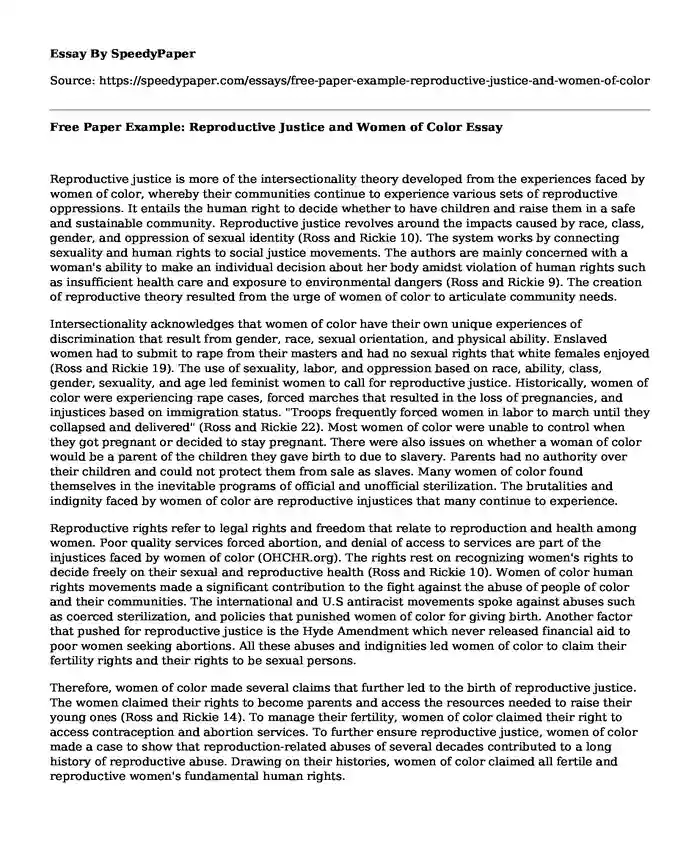Reproductive justice is more of the intersectionality theory developed from the experiences faced by women of color, whereby their communities continue to experience various sets of reproductive oppressions. It entails the human right to decide whether to have children and raise them in a safe and sustainable community. Reproductive justice revolves around the impacts caused by race, class, gender, and oppression of sexual identity (Ross and Rickie 10). The system works by connecting sexuality and human rights to social justice movements. The authors are mainly concerned with a woman's ability to make an individual decision about her body amidst violation of human rights such as insufficient health care and exposure to environmental dangers (Ross and Rickie 9). The creation of reproductive theory resulted from the urge of women of color to articulate community needs.
Intersectionality acknowledges that women of color have their own unique experiences of discrimination that result from gender, race, sexual orientation, and physical ability. Enslaved women had to submit to rape from their masters and had no sexual rights that white females enjoyed (Ross and Rickie 19). The use of sexuality, labor, and oppression based on race, ability, class, gender, sexuality, and age led feminist women to call for reproductive justice. Historically, women of color were experiencing rape cases, forced marches that resulted in the loss of pregnancies, and injustices based on immigration status. "Troops frequently forced women in labor to march until they collapsed and delivered" (Ross and Rickie 22). Most women of color were unable to control when they got pregnant or decided to stay pregnant. There were also issues on whether a woman of color would be a parent of the children they gave birth to due to slavery. Parents had no authority over their children and could not protect them from sale as slaves. Many women of color found themselves in the inevitable programs of official and unofficial sterilization. The brutalities and indignity faced by women of color are reproductive injustices that many continue to experience.
Reproductive rights refer to legal rights and freedom that relate to reproduction and health among women. Poor quality services forced abortion, and denial of access to services are part of the injustices faced by women of color (OHCHR.org). The rights rest on recognizing women's rights to decide freely on their sexual and reproductive health (Ross and Rickie 10). Women of color human rights movements made a significant contribution to the fight against the abuse of people of color and their communities. The international and U.S antiracist movements spoke against abuses such as coerced sterilization, and policies that punished women of color for giving birth. Another factor that pushed for reproductive justice is the Hyde Amendment which never released financial aid to poor women seeking abortions. All these abuses and indignities led women of color to claim their fertility rights and their rights to be sexual persons.
Therefore, women of color made several claims that further led to the birth of reproductive justice. The women claimed their rights to become parents and access the resources needed to raise their young ones (Ross and Rickie 14). To manage their fertility, women of color claimed their right to access contraception and abortion services. To further ensure reproductive justice, women of color made a case to show that reproduction-related abuses of several decades contributed to a long history of reproductive abuse. Drawing on their histories, women of color claimed all fertile and reproductive women's fundamental human rights.
Works Cited
OHCHR.org. "Sexual and Reproductive Health and Rights." OHCHR, 2015, www.ohchr.org/en/issues/women/wrgs/pages/healthrights.aspx.
Ross, Loretta, and Rickie Solinger. Reproductive Justice: an Introduction. University of California Press, 2017.
Cite this page
Free Paper Example: Reproductive Justice and Women of Color. (2024, Jan 28). Retrieved from https://speedypaper.com/essays/free-paper-example-reproductive-justice-and-women-of-color
Request Removal
If you are the original author of this essay and no longer wish to have it published on the SpeedyPaper website, please click below to request its removal:
- Essay Sample about Evolution by Natural Selection
- Terrorism Financing Essay Example
- Essay Sample on The X-Men as Social Commentary on Prejudice
- Essay Sample - Considering the Color-line
- Essay Example on the Use of Restorative Justice Practices in Sentencing Hate Offenders
- Free Essay Example - Human Resource Methods
- Essay Sample O Illegal Immigration Crisis in the United States
Popular categories





